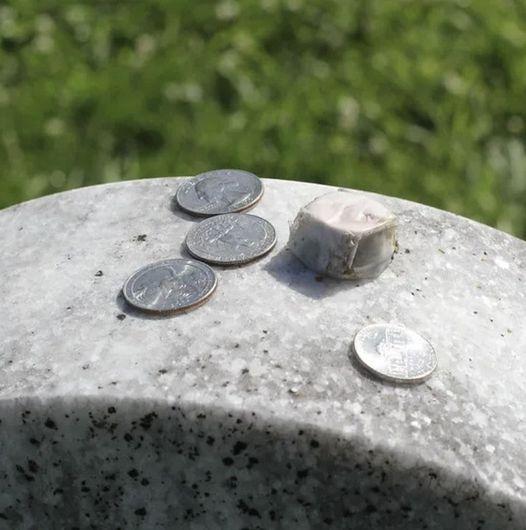

We all have different traditions when it comes to commemorating and paying tribute to our loved ones who have passed away.
In today’s world, honoring the customs of others while commemorating the lives of the departed ought to come as standard practice. Some may choose to follow traditions or practices that the rest of us are not familiar with, but it doesn’t make them any less legitimate.
The same is true with gravestones and the ornamentation certain families choose to place over their loved ones’ last resting places. Coins being placed on headstones is one custom that is widely practiced and that you have probably witnessed at some point. However, why is this even a thing? And from whence did it originate? Continue reading to learn more.
Coins are traditionally placed on gravestones in cemeteries around the United States and other countries. When I was a little child, I first observed it when I was at my grandfather’s tomb, and even then, I started to wonder what it was all about.
Luckily, finding the beginnings online doesn’t need much research. Although it was previously thought that the practice originated with Roman military troops, a number of sources have disproved that theory in recent years.
Still, there’s a military connection to leaving pennies on gravestones. The American Legion Website states on one of its pages that it can be linked to the Vietnam War.
“Leaving a coin was considered a more practical way to communicate that you had visited the soldier’s grave than contacting the soldier’s family, which could devolve into an uncomfortable argument over politics relating to the war, due to the political divide in the country over the war.”

There are other reasons why veterans leave pennies on gravestones in memory of their fallen friends; occasionally, they do so in order to purchase a beer for them. Each coin represents a different meaning, according to reports.
For instance, a nickel is left by someone who served in boot camp with the deceased, whereas a penny just indicates that someone was present.
On the other hand, a dime represents a combined period of military service. Next are quarters, which inform the family of the presence of whoever left the coin at the moment of the loved one’s passing.

Ever notice a penny left on a gravestone? Were you aware of its meaning? Tell us in the comments below.
Kentucky High School Blocks Diploma For Student Who Praised Jesus In Unscripted Graduation Speech

It can be difficult to declare one’s beliefs in today’s society without encountering opposition. Micah Price, a Campbell County High School alumnus from Alexandria, Kentucky, found himself in this situation. Micah bravely shared his faith in Jesus Christ during his graduation speech, which caused the institution to first withhold his diploma.
Micah was allowed to mention Jesus Christ in his speech on May 24 at Northern Kentucky University’s commencement ceremony, which took place at Truist Arena. He took use of the occasion to exhort other Christians to maintain their faith. He was met with thunderous ovation from the crowd as he said, “Class, before another word leaves my mouth, I must give the honor, the praise, and the glory to my lord and savior Jesus Christ.”

Micah declared, “Who in his very words tells us he is the light, he is the way, the truth, and the life,” going beyond simple acknowledgment. I’m here to inform the class and everyone in the audience today that if you don’t have any of those things in your life and you’re having trouble finding the solution, then my lord and savior is the solution. The audience applauded this sincere message, but school administrators were not happy with his deviation from the authorized script.
Following his speech, Micah was approached by administrators from the school, informing him that he would have to defend his actions to the board of education. He received a rebuke from the school and had his diploma temporarily delayed. As Micah said in a TikTok video, “I went off script during the speech, so one of the principals came in, tapped me on the shoulder, and very politely and professionally told me that I was going to have to go in front of the board and explain what I did.”
Micah had previously been permitted to name his “lord and savior Jesus Christ” by the Campbell County School District, but they had required he adhere to the preapproved script. “All speakers were told that going off their submitted speech, or any unplanned choices at graduation, may have repercussions as they would at any school function,” Superintendent Shelli Wilson said in her explanation. Other than this outpouring of Christian faith, off-program decisions like political election remarks, incorrect language use, or speech, signs, and caps supporting any cause or religion could have the opposite effect.

But Micah remained steadfast in his convictions. He said that in order to prevent dividing the audience, the additional preaching that was originally included in his screenplay was removed at the school’s request. He told WKRC, “I think it was okay that I thanked him, but maybe it wasn’t what they wanted when I went in and pushed them to follow him and other Christians to stand up and talk about him.”
Though they had been reprimanded, Micah didn’t feel bad for the school administrators since he understood they were just carrying out their duties. He said, accepting full responsibility for his acts, “I follow God’s instructions, not anyone else’s. Thus, I am the one at fault if anyone is. I should be punished. When Micah finally got his certificate after a protracted holiday weekend, he described it as “an answered prayer.”

Micah, who is planning to enrol in the US Air Force Academy, is unwavering in his convictions and has no regrets. “Holding it is simply a prayer that has been answered; nothing more,” he uttered. Many find encouragement in Micah’s steadfast faith and bravery in defending his convictions, which demonstrate the strength of willpower and conviction in the face of difficulty.
Micah’s story serves as a reminder of the value of standing up for our values in a world when it might be difficult to communicate such beliefs. His story inspires others to be brave and unyielding in their convictions by demonstrating the power of strong character and the significant influence of unflinching faith.



Leave a Reply